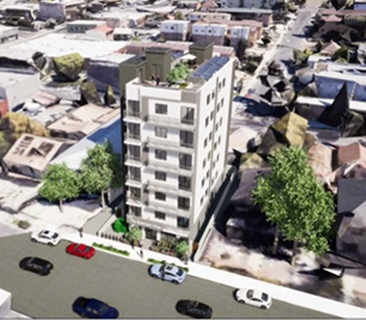Comments
AFFORDABLE HOUSING — On a quiet, unassuming stretch of Rosemont Avenue, a seven-story residential project promising 100% affordable housing has received approval to replace an existing four-plex. Slated for construction in the densely populated Westlake neighborhood, the project at 242 N. Rosemont Avenue has stirred both anticipation and anxiety among local residents.
The development, which falls under the city’s R3-1 zoning, is exempt from traditional parking requirements due to its proximity to public transit. Its construction aligns with Los Angeles Mayor Karen Bass's directive to expedite affordable housing production, particularly in the face of the city’s mounting homelessness crisis.
The project is leveraging state density bonus laws to maximize its buildable area, receiving five off-menu incentives under California Government Code Section 65915. These include reductions in yard setbacks and an increase in floor area ratio (FAR) to 6.68:1, more than doubling the normally allowed 3:1 ratio. Open space requirements were also significantly reduced, allowing for a mere 1,040 square feet instead of the required 3,200.
The seven-story building will provide 32 units of affordable housing, including one unit for an on-site manager. Twenty-five units will be reserved for low-income households, four for moderate-income households, and two for very low-income households, each with rent restrictions for at least 55 years. The units will range in size from compact 315-square-foot one-bedroom apartments to a two-bedroom unit totaling 410 square feet.
Despite the potential benefits, the project has raised concerns among the residents of 242 N. Rosemont Avenue, a rent-stabilized property. Due to its designation as a ministerial project, it was able to bypass the public hearing process, leaving neighborhood councils and local stakeholders in the dark about its approval. As of mid-August 2024, tenants said they had not received any formal notice from city officials about their impending displacement.
“It was a shock to hear about it,” said one tenant who wished to remain anonymous. “We’ve lived here for years, and now it feels like we’re being pushed out with no explanation.” Another tenant described the landlord’s minimal presence, noting that rent collection was the extent of their interactions. “There’s no real communication,” they added.

Further complicating the issue are the project’s architectural renderings, which some argue misrepresent the impact of the development on the neighborhood. The renderings depict large, mature trees flanking the new seven-story building, creating an almost idyllic streetscape. However, critics point out that these trees no longer exist, having been removed during recent development on adjacent lots.
On one side of the proposed development stands a new three-story duplex at 238 Rosemont Avenue, whose design adheres to the R3-1 zoning code’s requirements for front yard setbacks. Yet this building, along with others nearby, is conspicuously absent from the project's renderings. The plans also fail to reflect recent construction records, such as the certificate of occupancy issued in 2021 for the new buildings at 238 Rosemont.
“It’s misleading,” said one local resident. “They’re showing us a picture that doesn’t match the reality of what’s here.”
The situation encapsulates the broader tensions in Los Angeles as the city struggles to balance its urgent need for affordable housing with the rights of existing residents. While projects like the one at Rosemont Avenue aim to address the critical housing shortage, they risk displacing vulnerable tenants in the process.
As construction plans move forward, many of the current residents of 242 Rosemont are left uncertain about their future. Without adequate notification or community engagement, the potential benefits of such projects may be overshadowed by the costs to the people who call these neighborhoods home.
(Connie Acosta and James Hughes are Board Members of the Echo Park Neighborhood Council (EPNC) and the EPNC Planning and Land Use Committee. These are the opinions of the co-authors and do not reflect the opinions of the EPNC Board nor the Planning and Land Use Committee.)
















